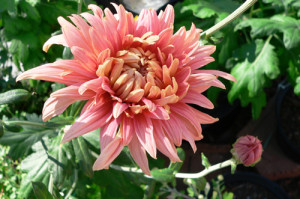Chrysanthemum (mum) is a plant. It gets its name from the Greek words for “gold” and “flower.” People use the flowers to make medicine.
Contents
Uses
- Chrysanthemum is used to treat chest pain (angina), high blood pressure, type 2 diabetes, fever, cold, headache, dizziness, and swelling.
- In combination with other herbs, chrysanthemum is also used to treat prostate cancer.
- As a beverage, chrysanthemum is very popular as a summertime tea in southern China.
Benefits
-
- Chrysanthemum can help the body fight off a range of infections including streptococcal and staphylococcal infections.
- The traditional Chinese have used the tea to treat influenza, fevers, inflammations and even heatstroke due to its cooling effect. The herb also helps to correct imbalances that may affect the liver and also helps in dealing with kidney function, thus helping with their treatment.
- A rinse made from the flower can be helpful to treat skin infections.
- The herb can be used in many different forms, from tinctures and creams to chrysanthemum tea that is very popular. While preparing the tea, care should be taken to let the flowers to boil in the hot water for around ten minutes. This should be done in order to protect the essential oil and other nutrients.
- Chrysanthemum tea is a great aid to digestion, helping the body to digest greasy food more easily.
- The tea is also helpful in relieving nasal and head congestion.
- Because of its zero calorie content, it is often used to treat obesity and as an aid to lose weight.
- It is also said to improve vision and hearing and is given in cases of dizziness, blurred vision and spots in front of the eyes. It may also be helpful in cases of night blindness and to treat conjunctivitis.
- New research has shown that the flavonoid acacetin that is present in chrysanthemum has the ability to inhibit malignant cell growth in the prostate region. This may make it a useful weapon in the battle against prostate and other forms of cancer.
- It is believed to be good for the heart and has been known to lower blood pressure levels. It may also be able to increase blood flow to the heart.
- Traditional Chinese medicine has used these properties of the flower to treat cases of hypertension and angina.
Cautions
- There isn’t enough information to know if chrysanthemum is safe. Chrysanthemum can cause skin to become extra sensitive to the sun. Wear sunblock outside, especially if you are light-skinned.
Interactions
- Please consult your nutritionist
Other names
Anthemis grandiflorum, Anthemis stipulacea, Chrysanthème, Chrysanthème des Jardins, Chrysanthemum indicum, Chrysanthemum sinense, Chrysanthemum stipulaceum, Chrysanthemum morifolium, Crisantemo, Dendranthema grandiflorum, Dendranthema morifolium, Fleur d’Or, Florist’s Chrysanthemum, Flos Chrysantemi, Ju Hua, Matricaria morifolia, Mum, Yao Jiu Ha, Ye Ju Hua
References
Source: Web MD, http://www.webmd.com/vitamins-supplements/ingredientmono-904-chrysanthemum.aspx?activeingredientid=904&activeingredientname=chrysanthemum
Home remedies, http://www.home-remedies-for-you.com/herbs/chrysanthemum-flower.html

